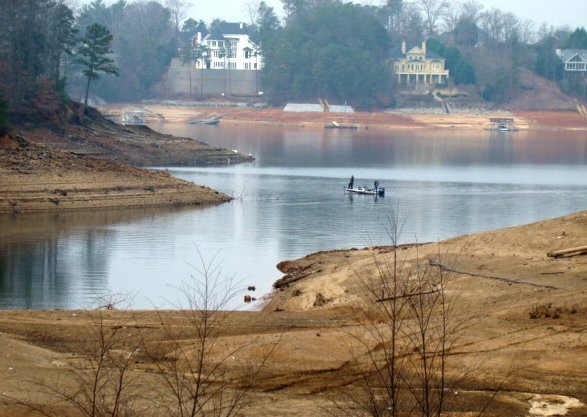GREENVILLE, S.C. - After the driest year on record for the region, the Greenville, S.C. Water System has only issued voluntary conservation measures for its customers.
Compare that to other cities along Interstate 85 like Atlanta and Durham, N.C., which have put in drastic water conservation rules and barring a rainy winter, have only months of water left in their reservoirs.
The Greenville Water System has been planning for dry times like this for decades, General Manager Lynn Stovall said.
It serves about 400,000 people with three different reservoirs, constantly monitoring the lakes to assure none of them are drawn down too far.
"We plan long term," Stovall said. "Flexibility is important."
The drought that was just starting to affect the state when 2007 started is now gripping nearly all of South Carolina.
It was the driest year ever in Greenville, even with more than five inches of rain in December. The airport in Greer ended 2007 with 31.08 inches of rain, more than 19 inches below normal. The late rains saved Columbia from recording its driest year ever, but the 31.37 inches of rain in the past 12 months was still almost 17 inches below normal.
It wasn't quite as dry in eastern and southern parts of the state. North Myrtle Beach was about 12 1/2 inches below normal, while Florence and Charleston were each a little more than 9 inches below normal for rainfall in 2007.
The U.S. Drought Monitor has 45 percent of the state in its most serious drought designation of exceptional. The worst conditions are roughly north and west of a line from Aiken to just north of Columbia to Dillon.
A year ago, only the far northwest corner of the state was reporting abnormally dry conditions, the lowest level of drought reported by the U.S. Drought Monitor.
The drought has caused some usual evens. Lakes Moultrie and Marion in the Lowcountry have dipped so low graves and other sites flooded when the lakes were created 70 years ago are being exposed. The black waters of the Grand Strand's Waccamaw River now run much clearer because the river's channels to the dark swamp water have dried up.
Long-term forecasts are grim for the state. Forecasters are calling for below-normal rainfall for the rest of the winter, giving lakes, rivers and soil little time to recharge before the weather gets warmer.
The Greenville Water System will keep monitoring water levels and asking its customer to conserve. But "so far, things have worked out well," Stovall said.
---
On the Web: U.S. Drought Monitor: http://drought.unl.edu/dm/monitor.html
Sunday
July 13th, 2025
3:36AM









